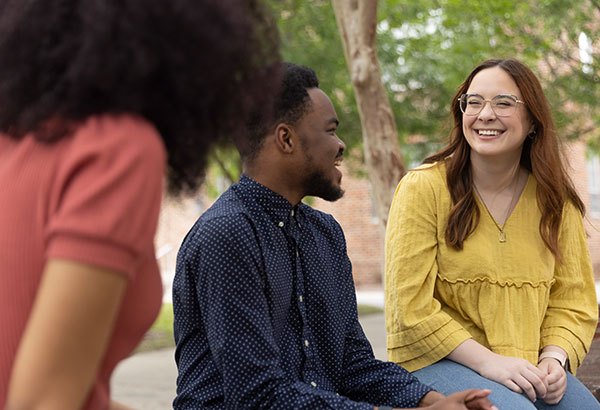Irene Nero
President's Award for Excellence in Teaching
THE ART OF TEACHING
Teaching is often referred to as an art form. If that is an accurate description, then it is highly appropriate that this year’s recipient for the President’s Award of Excellence in Teaching, Irene Nero, is an associate professor of art history.
Nero has been teaching art history classes at Southeastern since the fall of 2000, and she helped co-create the art history concentration curriculum in 2009. She has a doctorate in 19-20th century art and architecture with a secondary concentration in medieval art and architecture.
“Irene Nero is without a doubt one of the best teachers in our department and, I believe, at Southeastern,” said Visual Art + Design Department Head Dale Newkirk. “She has the ability to captivate students with stories from art history in a way that makes the subject come to life. Through her teaching, she has affected our students by opening their minds to new ideas and by giving them a window into the past. On a number of occasions, students have told me that Dr. Nero has changed their lives. To have this effect on students through art history is amazing.”
In addition to teaching, Nero spends hours nurturing and guiding her students through their research, and her efforts have achieved great results. Her students have advanced to masters and doctorate programs, and many are working in museums, universities and private collections across the country. Several of Nero’s students return to Hammond to visit her, and some of her former students have returned to campus to give lectures in the Let’s Talk Art Series, which she co-founded with Sims Library Director Eric Johnson 10 years ago.
“I have seldom met an individual who was so passionate about her field, about teaching and about imparting this passion to students and opening their eyes to the world of art,” said Johnson. “Fortunately, her broad knowledge is matched by a warm, inviting personality and a strong work ethic.”
Nero has had a love for teaching since she was a young girl.
“Simply said, teaching is my passion in life. As a child, I loved going to school, and I loved my teachers. I would go home and play ‘school,’” she said. “Today is no different. I am constantly thinking of new ways to engage students, like debates, quiz bowls and performance pieces.”
Nero has authored a book on Frank Gehry, published articles and chapter essays, received a host of grants, served as a reviewer and evaluator, and assisted students with papers, presentations and senior theses. She has served on university committees, co-coordinated workshops on grant writing and professional development, and acted as an adviser for the Southeastern Visual Arts Society, the Art History Association, and Kappa Pi, the arts honor society.
Nero creates classes that offer a humanist approach to every class topic. She routinely teaches two survey level classes each semester, and enjoys introducing students to the socio-cultural history of humankind and making it relevant to their specific disciplines.
“I explain to my students that regardless of what their discipline is, artists have covered the topic, including digital technology,” she said. “They are often non-believers until we discuss their major area of study.”
Above all, Nero tries to inspire her students to look beyond themselves to a world of greatness – great minds, great knowledge, and great actions – and to incorporate those ideas into their lives. She shows them carefully carved miniscule artifacts, mural-size paintings, life-size sculptures, and buildings that accommodate thousands of people and asks them to imagine making the objects, holding them, standing in front of them, or, in the instance of a building, standing in the space.
“I encourage them to consider having made the work of art. Through using these works as examples, I try to help students understand that being human is the one thing we all have in common, and that through the study of art, it is possible to connect intellectually and emotionally with all cultures and time periods,” Nero explained.
“I approach my students and classroom lectures with respect and enthusiasm, fully expecting great results, and I am rarely disappointed by them,” she said. “I always tell my students on the first day that I plan to have a good time, and I hope they will too!”







